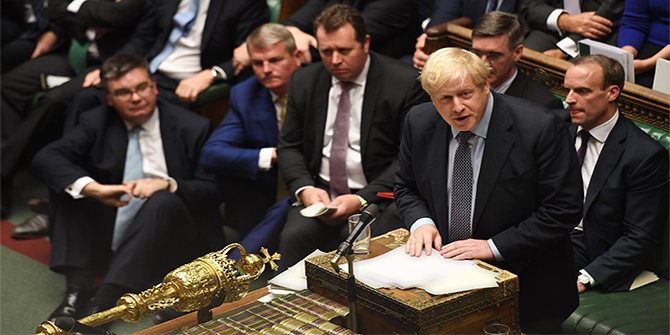 With the return to a traditional single-party majority, Boris Johnson’s government will be invoking a strong mandate for its policy programme. Ruxandra Serban explains that, while the UK Parliament is well-equipped – better than most other parliaments – to question the Prime Minister on various matters, this accountability relationship can only function if Johnson follows certain established conventions. His track record of doing so is grim.
With the return to a traditional single-party majority, Boris Johnson’s government will be invoking a strong mandate for its policy programme. Ruxandra Serban explains that, while the UK Parliament is well-equipped – better than most other parliaments – to question the Prime Minister on various matters, this accountability relationship can only function if Johnson follows certain established conventions. His track record of doing so is grim.
With the Conservative Party winning a commanding majority in the House of Commons, Boris Johnson has declared ‘a clear mandate to take the UK out of the EU’, and is likely to invoke a similar mandate for a number of other matters. Can Parliament hold Johnson to account when it comes to his policy programme as well as his key role in the unfolding Brexit process?
The accountability relationship
In parliamentary democracies such as the UK, the government derives its authority from the elected parliament, to which it is accountable. This relationship is more complicated with respect to the Prime Minister, whose powers and responsibilities are not codified (aside from the information provided by the Cabinet Manual). The PM is the head of government and in this capacity coordinates and ‘speaks for’ the government. The PM also exercises a set of prerogative powers on behalf of the sovereign, such as making government appointments, while they also take a leading role in foreign affairs. This complexity does not translate into a clearly defined accountability relationship with parliament: if the PM’s roles and powers are difficult to define, what should parliament hold the PM to account for?
Nevertheless, parliament is in an exceptionally good position to hold the PM to account in the full complexity of their role through a set of mechanisms that allow MPs to ask questions. The first is the well-known Prime Minister’s Questions. Although criticised for being theatrical and adversarial, PMQs provides a ‘routine check-up’ on current affairs and an opportunity for regularised dialogue between the PM and MPs. The second is the Liaison Committee, comprising the Chairs of House of Commons Select Committees, where the PM appears two or three times a year for more extended questioning. Finally, MPs may also question the PM after they make statements to the House of Commons, which conventionally happens after international summits or other important events.
Compared to other countries, this is a unique arrangement for accountability: a majority of parliamentary democracies only provide one mechanism for the PM to be questioned. At the same time, the British PM enjoys great freedom in establishing the particularities of their relationship with parliament: Tony Blair decided to change PMQs from the twice-weekly sessions to the current format of 30 minutes on Wednesday; and it was also Blair who decided, in 2002, to appear before the Liaison Committee to answer questions, after first having refused the Committee’s invitation, invoking the convention that the Prime Minister does not appear before Select Committees. Although the Commons does not have means to summon the PM to answer questions, PMs have, conventionally, attended to their duty to give account. Aside from regularly attending PMQs, David Cameron appeared before the Liaison Committee 15 times during his two premierships, and Theresa May six times. Consequently, in order for the coordinates of the accountability relationship to be maintained, the PM must be willing to commit to a regular dialogue with parliament.
Johnson’s track record
This relationship has recently been strained. The complicated parliamentary timeline during Boris Johnson’s first premiership, which began at the end of July 2019 just before the summer parliamentary recess, and included two periods during which parliament did not sit meant that he was only questioned at PMQs three times – on 2 September, 23 October, and 30 October.
Similarly, a day before his scheduled appearance before the Liaison Committee, Johnson – who had already cancelled appearing before the Committee twice before – wrote to the Committee’s Chair to cancel his appearance, motivating that he had to attend to Brexit-related matters. In his letter, Johnson also demanded to be questioned within ‘five or six months’ after he became PM. This refusal to appear to answer questions, as well as the request to be scrutinised after a specified time period, are not only unprecedented, but also problematic. At a time of fast-paced decision-making with respect to Brexit, it is crucial for parliament to be given the opportunity to hold a structured, in-depth questioning session with the Prime Minister. The Liaison Committee, as a cross-party committee, is very well placed to do this.
Parliament is now set to return on 17 December. The new government will face important challenges in the months ahead, crucially deciding the next steps on Brexit before the deadline of 31 January 2020, as well as planning subsequent stages in negotiating Britain’s relationship with the EU. It will therefore be important to re-establish a regular dialogue between the head of government and parliament.
Questioning mechanisms and the new parliament
The dynamics of PMQs are likely to change, but primarily at the level of interactions between leaders. Given Labour’s significant defeat, and Jeremy Corbyn declaring that he will not to lead Labour into the next election, the Prime Minister will face questions from a much-weakened Leader of the Opposition. As the SNP is now the third largest party, Ian Blackford, the SNP’s leader in the Commons, could be assigned a regular slot of three questions, which would give him a frontstage role in questioning Johnson each week. But the rules and conventions of PMQs mean that there will not be significant changes in the opportunity of backbenchers to question the Prime Minister: the process ensures that 15 randomly-selected backbench members get to ask a question each week; and in addition to the shuffle, the Speaker conventionally seeks balance between government and opposition members in calling other members to ask questions. This means that Labour backbenchers can still pursue a systematic questioning agenda.
The process of establishing Select Committees at the beginning of the new parliament will inevitably create a gap in scrutiny, and could delay an appearance of the Prime Minister at the Liaison Committee for yet some time. According to House of Commons procedure, once the Speaker communicates the allocation of Chairs to parties based on the number of seats held, Committee Chairs (with the exception of the Backbench Business Committee) are then elected by the whole House. Once chairs are elected, and once the membership composition is agreed by the usual channels, parties vote internally for the membership of individual Committees. After the 2017 general election, this process took a few months, with most select committees beginning their work in the autumn of 2017, and the Liaison Committee being up and running in November that year.
Once these arrangements are finalised, a priority should be for the new Liaison Committee Chair to ask Johnson again to appear before them to answer questions about the government’s strategy for Brexit, and particularly to commit to regular appearances throughout the new parliament. The Committee could suggest increasing the number of appearances from three to four or five times a year, and agreeing the schedule of sessions in advance. A fixed schedule could provide a solid framework within which the Committee could plan topics and directions of scrutiny. A set of these sessions could be dedicated exclusively to Brexit, similar to the sessions held with Theresa May in 2017-19. In addition to this, other sessions could be dedicated to domestic or foreign policy issues, ensuring that Johnson continues to be questioned routinely on matters to do with their actions and decisions, as well as government policy, outside of Brexit. A commitment on this schedule of appearances in parliament would signal that the Prime Minister is ready to discuss both the government’s manifesto pledges and other aspects of domestic policy, as well as to hold a regular dialogue on Brexit.
Openly committing to upholding the conventions of prime ministerial accountability through a regular dialogue with parliamentarians will be essential for maintaining a balanced relationship between government and parliament, and will signal the government’s respect for parliament’s role in scrutiny.
_________________
 Ruxandra Serban is an LSE Fellow in Qualitative Methodology in the Department of Methodology. Her PhD investigated the relationship between prime ministers and parliaments in 31 countries.
Ruxandra Serban is an LSE Fellow in Qualitative Methodology in the Department of Methodology. Her PhD investigated the relationship between prime ministers and parliaments in 31 countries.
All articles posted on this blog give the views of the author(s), and not the position of LSE British Politics and Policy, nor of the London School of Economics and Political Science. Featured image credit: UK Parliament/Jessica Taylor/ Stephen Pike (CC-BY-NC 2.0).








2 Comments